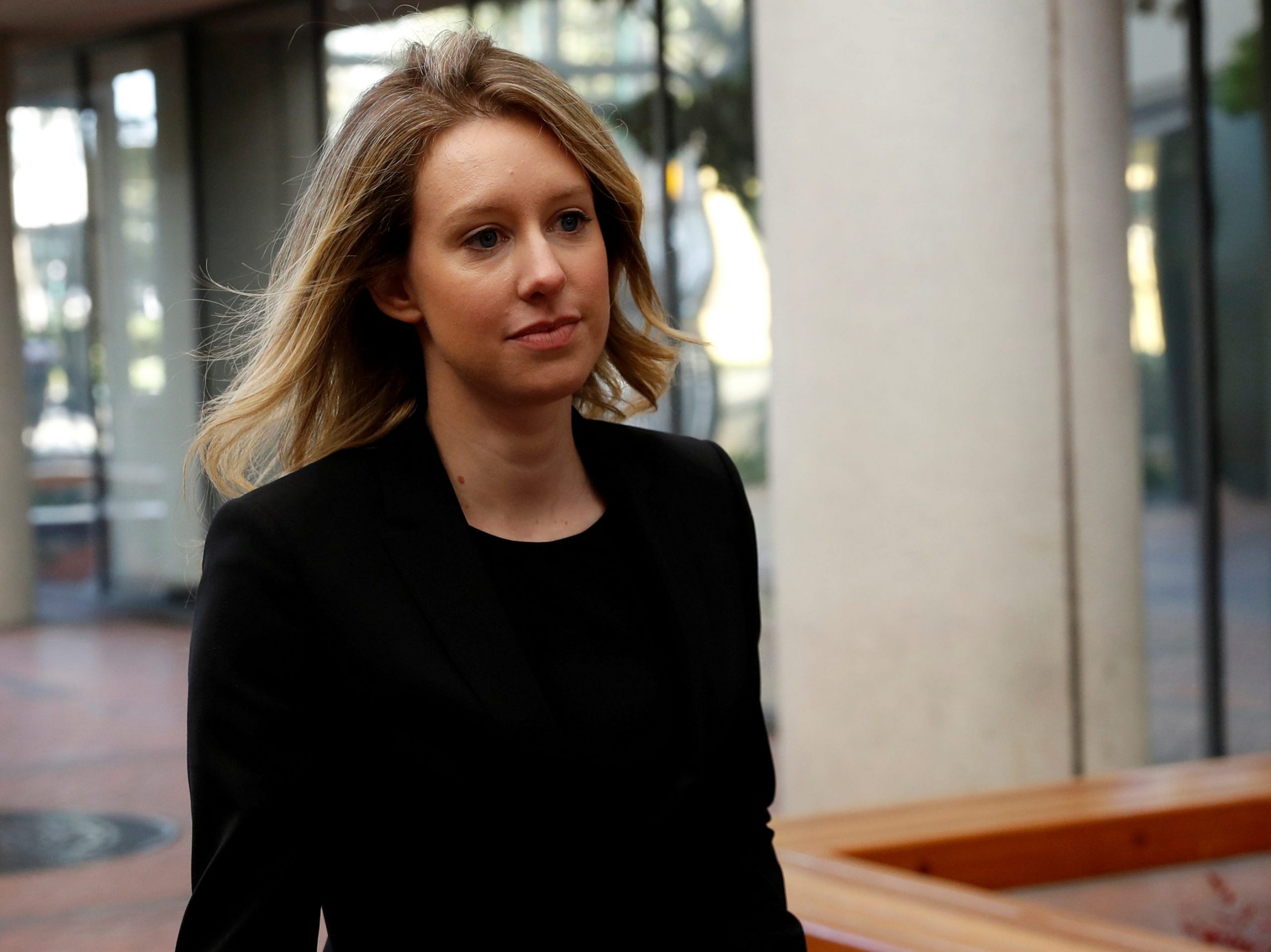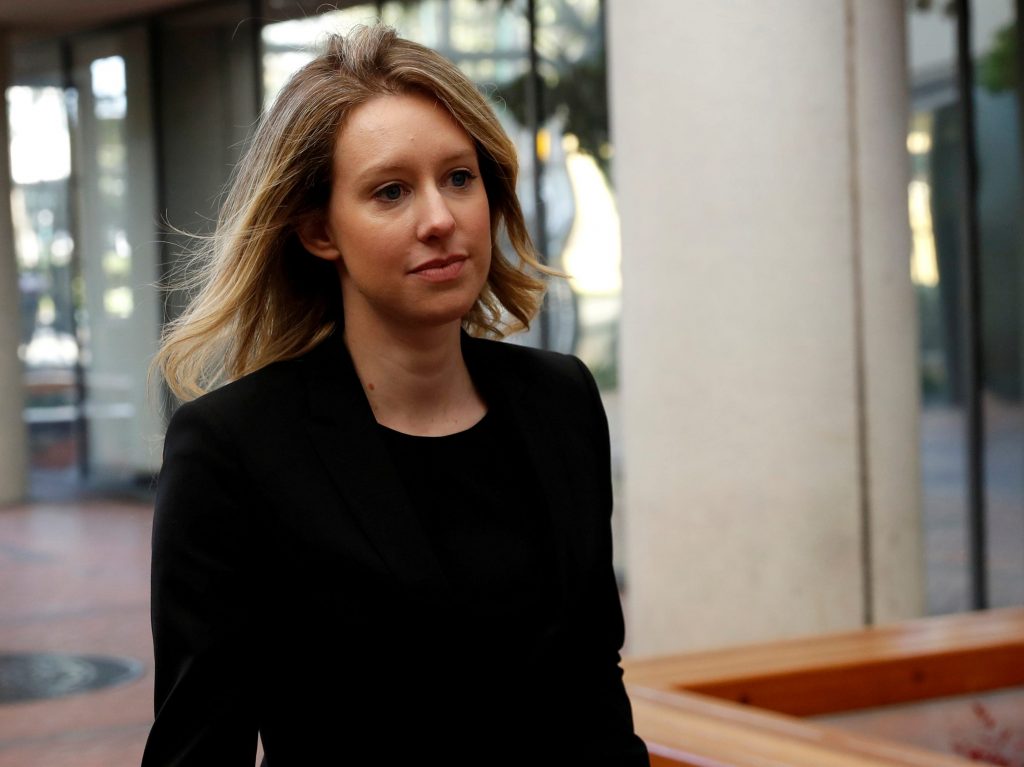
Reuters/Stephen Lam
- The fraud trial for Elizabeth Holmes, founder of blood-testing startup Theranos, begins Tuesday.
- Holmes and former COO Ramesh Balwani are accused of defrauding investors, doctors, and patients.
- If she's convicted, Holmes faces up to 20 years in prison, $2.75 million in fines, and restitution.
- See more stories on Insider's business page.
Blood-testing startup Theranos and its founder, Elizabeth Holmes, were once the subjects of spectacular praise, hailed for their promise to revolutionize diagnostic testing in healthcare. Federal investigations soon followed as the company's practices raised suspicions. Now, Holmes is a defendant in a federal fraud trial.
Here's how she got here and what you can expect from the trial:
Who is Elizabeth Holmes?
When Elizabeth Holmes was 9 years old, she told relatives she wanted to be a billionaire when she grew up, according to Bad Blood: Secrets and Lies in a Silicon Valley Startup, which documents Theranos' rise and fall. Around the same time, Holmes wrote in a letter, "What I really want out of life is to discover something new, something that mankind didn't know was possible to do."
Holmes studied chemical engineering at Stanford before dropping out in 2003 to work on Theranos when she was 19. In 2014, she was dubbed the world's youngest self-made female billionaire, boasting an estimated net worth of $4.5 billion. Holmes was one of a handful of women leading a Silicon Valley unicorn and was hailed as a visionary. Taking after Steve Jobs, one of her heroes, Holmes often donned black turtlenecks and never took vacations. She also drew attention for her uncharacteristically deep voice, which some former Theranos employees believe was faked, perhaps to help Holmes better assimilate in the male-dominated startup world.
What was Theranos?
Theranos was a blood-testing startup that developed a test for a variety of health conditions with blood from a single finger prick, unlike traditional blood tests, which often require multiple vials of blood. Theranos' tests also promised to be cheaper, faster, and more accurate than traditional blood tests. Holmes said its technology, known as Edison machines, would create "a world in which no one has to say goodbye too soon." At its peak, Theranos was valued at $9 billion.
Who is Ramesh "Sunny" Balwani?
Ramesh "Sunny" Balwani was president and COO of Theranos. Before joining the company in 2009, Balwani was a software engineer at Microsoft and Lotus.
Balwani and Holmes, who is roughly 20 years his junior, met in Beijing through Stanford's summer Mandarin program in the summer before Holmes went to college. Around the time Holmes dropped out of Stanford, they became romantically involved. They broke up in 2016, according to "Bad Blood," and Balwani left the company that year.
What caused Theranos' downfall?
In August 2015, FDA investigators visited Theranos, demanding to inspect its facilities. Around the same time, regulators from the Centers for Medicare and Medicaid Services found major inaccuracies in Theranos' tests and said the company gave dozens of patients questionable test results, according to Vanity Fair. Two months later, reporter John Carreyrou published a bombshell investigation in the Wall Street Journal that said only 15 of the 240 tests Theranos offered were performed on the company's Edison machines. The other tests, he wrote, were conducted using traditional blood testing machines.
The SEC also began investigating Theranos, and in July 2016, Holmes was banned from working in the lab-testing industry for two years. Later that year, Theranos shuttered its lab operations and wellness centers. Holmes stepped down as CEO in June 2018 on the same day the Department of Justice charged her with wire fraud and conspiracy.
What are the charges and possible punishments?
Holmes and Balwani are each charged with two counts of conspiracy to commit wire fraud and nine counts of wire fraud. If they're convicted, for each count, they'll face up to 20 years in prison, a fine of $250,000, and restitution to victims.
The US Department of Justice alleges that Holmes and Balwani took part in schemes to defraud investors, doctors, and patients by making deceptive claims about Theranos, its financial outlook, and its technology.
How have Holmes and Balwani responded to the allegations?
Holmes and Balwani have both pleaded not guilty to the charges.
After Carreyrou published his bombshell story, Holmes responded by saying, "This is what happens when you work to change things. First they think you're crazy, then they fight you, and then all of a sudden you change the world."
Who were Theranos' investors and board members?
Theranos tapped several high-profile figures for investments and board seats.
Some of the company's biggest investors included News Corp Executive Chairman Rupert Murdoch, former US secretary of education Betsy DeVos, and members of the Walton family, who are heirs to the Walmart empire.
On its board, the company featured names like former US Secretaries of State George Shultz and Henry Kissinger, former US Secretaries of Defense William Perry and James Mattis, and former Wells Fargo CEO Richard Kovacevich.
What's next?
Jury selection begins Tuesday, and opening statements are slated for September 8. The trial had previously been delayed due to COVID-19. In March, Holmes requested and received a delay because she was pregnant.
A separate trial for Balwani will start in January.
